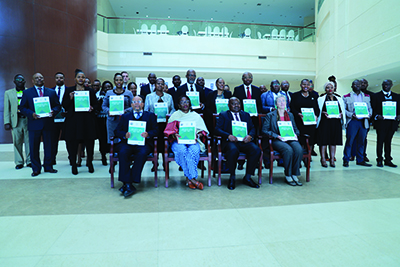
By Thoboloko Ntšonyane
MASERU – Addressing long pending demands, the Judiciary has, with the support of the European Union (EU) and the United Nations Development Programme (UNDP), launched its Strategic Plan 2022-2027 as well as its website on Friday last week.
Speaking at the launch in Maseru, Chief Justice Sakoane Sakoane welcomed these developments saying Lesotho was lagging behind in making judgments easily accessible through the internet. Chief Justice Sakoane added that Lesotho was the only country within the Southern Africa Development Community (SADC) region whose Judiciary operated without a strategic plan.
The Judiciary Strategic Plan 2022-2027 pays premium to the three focal areas which will be pursued in the course of five years namely; excellent judicial services, motivated and capable workforce, as well as enhanced public trust and organizational image.
“The purpose of this website is to be a forum or a space where everything and anything that has to do with the Judiciary will be found. As you are aware, we generate judgments and all the judgments henceforth are going to be uploaded and found in that website [www.jud.gov.ls],” the Chief Justice said.
Chief Justice Sakoane indicated that going forward they will also upload the judgments of the subordinate courts, appealing to them in order to “tidy up” their work. He further added that there will be a vetting process that will be done for quality control.
The Strategic Plan 2022-2027 has a case management system, wherein cases will be automated in an order which would have them disposed of timely. Also, this system will address the backlog of cases as well as the manual work which could “not allow for transparent operations and checks and balances”.
Meanwhile, both higher and subordinate courts have come under fire for delaying to dispense justice. Lesotho’s judiciary vision is to “be a Judiciary that delivers accessible, swift and quality justice”. The country’s judiciary was one of the sectors which were earmarked to undergo the reforms process.
Taking stock of the work done by the National Reforms Authority (NRA), the Chief Justice said that a lot of things were left out, saying the Executive lacked “political will” as well as highlighting that in Lesotho, the Judiciary has been treated as the appendage of the Ministry of Justice and Law.
“We are claiming independence and we are going to protect it,” he said.
EU Head of Delegation to Lesotho, Paola Amadei, said that the Judiciary like any other institution needed a “clear vision and strategy on what it wants to achieve”.
EU Ambassador to Lesotho remarked that, “The launch of the Judiciary Strategic Plan 2022-2027 presents such a strategy and can serve as guidance for the medium-term future. We are content to see that the Strategic Plan includes clear analysis of current challenges faced by the Judiciary.
“We note that these challenges include financial problems, issues with the institutional structure, issues with the management of cases, the lack of external institutional support and a negative public perception of the Judiciary.”
Amadei said the support of the Judiciary as the one of the arms of government is one of the areas of cooperation between EU and Lesotho.
She further noted that there is progress registered, but warned there is still work ahead.
For her part, the United Nations Development Programme (UNDP) acting Resident Representative Nessie Golakai-Gould said the administration of the case management system and the website will go a long way for the Judiciary solidifying it as a “beacon of hope” to Basotho and everyone seeking justice in the country.
“The Judiciary’s Strategic Plan which we are launching here today reminds the Judiciary of its core values to embrace such as the predictability, continuity, coherence, reasoned decisions made to public…,” she said.
The acting Resident Representative further impressed on the necessity of the “high ends of fairness” and “impartiality” in the administration applauding the Judiciary for this step forward.
She further challenged the Judiciary to “take bold steps towards gender empowerment especially at the higher levels of the Judiciary”.
Lesotho Law Society’s Vice-President Advocate Lintle Tuke welcomed these developments, saying the launch is the “momentous occasion” expressing reservation that it is “embarrassing” that the country only has the website in 2022.
He further said the move is a “step in the right direction”.
Advocate Tuke said the website should be fed with content in order to remain active.
Section 118 (3) of the Constitution of Lesotho enjoins the executive to accord the Judiciary with the resources to enable it to function optimally, be that as it may, Judiciary says it experience budget cuts and is unable to operate effectively and efficiently as a result of the shoe string budget it has.
“The Government shall accord such assistance as the courts may require to enable them to protect their independence, dignity and effectiveness….”
Flagging some of the challenges that have bedeviled the Judiciary, the Strategic Plan says: “The Judiciary has not been able to offer on-going training to its staff. As a result, it operates with a very demotivated work force. It is also lacking competency in key areas such as leadership and research….”


